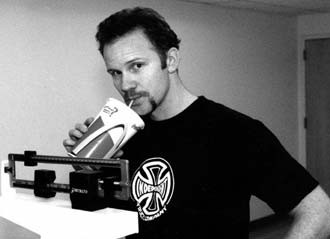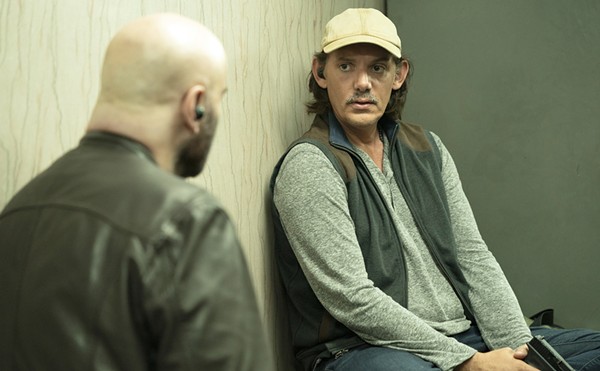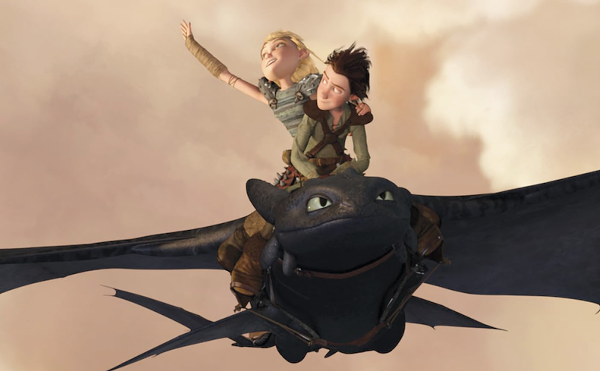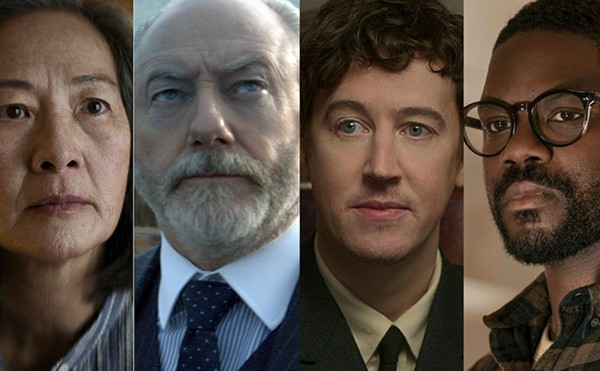|
By Steven G. Kellman Ballooning 60 pounds to play former boxer Jake LaMotta, Robert De Niro earned an Oscar. Charlize Theron also won an Oscar when she put on 30 pounds and prosthetic teeth to play serial killer Aileen Wournos. Though Morgan Spurlock gained 25 pounds and put himself at severe risk of liver failure to play himself, he will likely have to settle for a Ronald McDonald doll instead of an Academy statuette. In Super Size Me, his first feature film, Spurlock serves as his own guinea pig to test the hypothesis that a steady diet of fast food is hazardous to a consumer's health. Spoiler alert: By the final frames, a vigorous man in his thirties has become a depressed, exhausted maw, a swollen bundle of human tissue diagnosed as gravely ill. Super Size Me contains no surprise ending. Because McDonald's controls 43 percent of the fast-food market in the United States, Spurlock conducts his experiment entirely under the golden arches. He resolves that for an entire month he will eat three meals a day at McDonald's. He will order everything on its menu at least once and will opt for the largest portions whenever prompted by an employee. Spurlock lives in Manhattan, where he has convenient access to 83 McDonald's franchises, but he also travels to Massachusetts, Washington, D.C., California, Illinois, and Texas in order to stuff himself with burgers, shakes, fries, and other culinary artifacts of Western civilization. From beginning to end of his dreadful ordeal, Spurlock is monitored by three increasingly appalled physicians and pitied by his vegan girlfriend. Billions of dollars in advertising and marketing ensure that the McDonald's corporation sells billions of burgers. Spurlock, who is particularly incensed at how junk-food conglomerates prey on minors, seducing them with clowns, toys, and playgrounds, notes that the average American child is exposed to 10,000 food ads on TV annually. Super Size Me is a 96-minute anti-commercial, designed to demonstrate that Big Mac means big trouble.
Spurlock interviews Don Gorske, who has been eating at least two Big Macs a day for years, as well as Bruce Howlett, who undergoes radical fat reduction surgery in Houston. He visits school cafeterias to reveal how nutritionally deficient their menus are, how educators have sold out to processed-food conglomerates. He finds physical education programs drastically reduced even as girths have expanded. He stops strangers on the street to reveal the range of nutritional illiteracy; no one but Nestlé can begin to define a calorie. Nothing in this film should startle readers of Eric Schlosser's best-selling Fast Food Nation, or any reasonable consumers who think about how they spend their money and make their dining choices. That those decisions are not widely governed by knowledge and common sense is reflected in the fact that two out of three Americans are either overweight or obese. There is surely some connection between the fact that each day one out of every four Americans visits a fast-food establishment and the epidemic of obesity, the second most common cause of preventable death in the nation. You and I, dear reader, may have better sense and taste than to bloat our buns with an immense white-flour bun surrounding greasy, reconstituted cattle parts. But most of our compatriots apparently do not. Super Size Me seems aimed at them, though it is not the kind of movie that draws audiences of popcorn-gorgers. Spurlock is retching to the choir. He does use humor to sweeten his sermon against refined sugars and other addictive toxins, though: Attempting to emulate the guerrilla cinema of Michael Moore, he is stymied in his bid to interview the CEO of McDonald's. Spurlock finished production too soon to report that that elusive CEO died suddenly of a heart attack and that his successor underwent emergency surgery shortly thereafter for colorectal cancer. Spurlock's critique of fast food focuses entirely on his personal health. Driving a gas-guzzling SUV, he ignores how, by leveling rainforests and ravaging grasslands, the factory farms that feed the lust for animal flesh are devastating the environment. Nor does Spurlock seem at all concerned about the enormous cruelty to cows, pigs, and chickens required to feed McDonald's profits. The success of fast-food chains is symptomatic of a culture of narcissism, in which nothing is more compelling than individual comfort. After Super Size Me, no one can consider cheeseburgers a comfort food. •
Documentarian discusses his month-long odyssey in McDonaldland By John DeFore Super Size Me director Morgan Spurlock has been easy to spot on the publicity trail lately. We caught up to him in March at South By Southwest, where his hot-button movie was playing to sold-out theaters. John DeFore: In the film's credits, you thank your ex-wife's insurance company. Can you explain that? It's hard to believe that this experiment would be covered by any policy. Morgan Spurlock: Thank goodness I had health care. My body was sick; I was legitimately ill. JD: Still, that's a hell of a health plan, where you can go out and get three doctors you can call on at will. And that was all covered? MS: It was all covered, through an insurance provider that I will not name. JD: Have you gotten any grief from them about this? Like, "Here we've spent all this money on something that you obviously did to yourself intentionally"? MS: I don't think they are that aware of it. They know about me being ill, but they don't know about the film, they don't know everything that went along with it. JD: So you're gonna get some grief. MS: Maybe. But at the same time, there's a greater good that's gonna come from this. JD: But you're going to have to wind up paying those bills. MS: `playfully` No, I'm not! That's why I have a health plan. JD: Yeah, but that's like saying, "I can go out and chop off my foot and have it paid for ... " MS: The thing is, how many people are eating this food and doing things they know are bad for them, but still going to doctors? My goal, hopefully, is that people will go see this film and change their ways somewhat. JD: So you're going to argue to the insurance company that you're saving them money down the road. MS: It will save money! It will. Just now, we've eliminated Super Size portions. `Shortly before SXSW, McDonald's announced it was phasing out the menu option.` JD: That's astounding, before you've even been in three film festivals. MS: We'd only been in Sundance at that point. It was six weeks after Sundance that they made the announcement. As much as they say in their press release that this had nothing to do with the film whatsoever, you can't help but think the film did somehow light the fuse. JD: It's very shocking when, 20 days in, you start getting these very dire warnings from your doctors. We see this crisis, where you're trying to decide whether to continue. Were there any precautions you took at that point that you don't show in the film? MS: The only thing that's probably not in the film was the amount of people I called at that point. You see me call my girlfriend and the three doctors, but I called countless people, and everyone was like, "You have to stop. There's no reason to keep going, with what's happened to you." And then I called my older brother, and he said "Morgan, people eat this shit their whole lives. You think it's gonna kill you in nine more days?" And I thought that was the most valid point yet. JD: What was the weight-losing process like, after the month? MS: The amazing thing was the withdrawal symptoMS that my body started going through immediately after the diet. I think your body really does get some sort of addiction to fat and sugar and caffeine, to want it and depend on it. The immediate day after wasn't that bad, but the day after that, I woke up and hurt all over. It felt like somebody was hitting me with a sledgehammer on my head. My whole body ached, I was sweating. It was almost like I had the shakes. My body was trying to get rid of the stuff in there, but at the same time was wanting it. Once I started getting into vegetables and all-natural foods, and got away from processed foods, my body started to adapt. For the first eight weeks, I didn't exercise. All I did was change my diet. I completely changed my diet away from the food I'd been eating, and it took about six to eight weeks for all my body functions to come back to normal. JD: You didn't immediately start an exercise routine because you didn't want to push your body? MS: I also wanted to see what would happen if I just changed the food. After two months of just doing a kind of detox diet and flushing this food out, all of my body functions came back to normal. Everything came back to where it was before. I lost 10 pounds in the first eight weeks. After that, I started going back to the gym and exercising quite a bit. I was riding my bike to work, and it took me about five months to lose the next 10 pounds. And I still haven't lost all of it. Even now, I'm about three pounds over. •
|


















